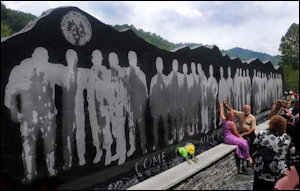This week is the tenth anniversary of one of the worst coal mine disasters in recent U.S. history. The massive explosion at the Upper Big Branch at Montcoal, W.Va. on the afternoon of April 5, 2010 killed 29 miners, the largest number in 40 years.
The disaster meant the undoing of Massey Energy, a Richmond-based company that had been widely called out for its safety violations and mountain-top removal mining practices.
I wrote a book about the firm and Central Appalachian coal that was published by St. Martin’s Press in 2012. West Virginia University Press bought paperback rights to the book and we published an expanded and updated version in 2016.
Today, I have a remembrance in today’s Washington Post. It will be in print this Sunday on the Local Opinions page in the Metro section.
For many years, Massey Energy and its predecessor firm, A.T. Massey, operated a headquarters in a chunky building in downtown Richmond. The Massey family has been generous with its local donations and has helped such institutions as the Massey Cancer Center at Virginia Commonwealth University and the Virginia Institute of Marine Science.
The Massey family was notorious for breaking labor unions but during the two years it took to research the book, I learned that miners felt the firm listened to them and tried to take care of them.
Then a stocky man with a moustache, Don Blankenship, took over. He became notorious for skimping on safety and micro-managing. He served a year in federal prison for ignoring safety at UBB.
Now, he’s running for president on the Constitutional Party ticket and has a new book out titled “Obama’s Deadliest Coverup.” I just got an E-book copy yesterday and haven’t had time to read it all. But from what have read, it is a rambling apologia that comes up with some striking and predictable arguments such as the massive blast was caused by natural gas and not poor coal dust mitigation practices. His statements contradict what four separate investigations found.
Blankenship, a Republican, tries to make this all sound like a conspiracy headed by President Barack Obama. That’s a bizarre premise since Obama had only been in office for a little more than a year when the blast happened.
For the record and before we get into the “War on Coal” arguments, please keep in mind that much of the coal at UBB was metallurgical coal for steel-making. It was largely exported to Asia, Latin America and Europe. So, it didn’t really have much to do with “Keeping the Lights On” in America, as coal lobbyists would have you believe.


Leave a Reply
You must be logged in to post a comment.